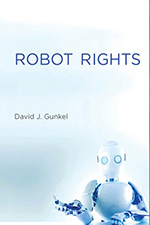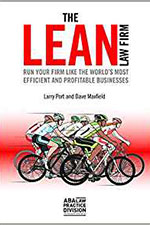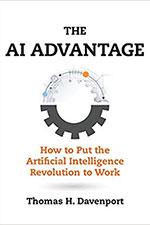 VERDICT: It’s a Keeper
VERDICT: It’s a Keeper
Robot Rights
By David J. Gunkel (Cambridge, MA: The MIT Press, 2018). 256 pgs. $35. Order, mitpress-orders@mit.edu.
Reviewed by James Casey
We are in a time of unprecedented technological, economic, and social change. There is the unrelenting automation of blue- and white-collar jobs, the merits and demerits of the internet, the rise of artificial intelligence (AI) and the internet of things (IoT), and the continuing social and political battles over human rights and responsibilities. Especially with technological change and innovation, there is a constant march forward (or backward?) that elected officials and the general public have a hard time controlling and managing. These are interesting times, indeed.
Thus, the timing is right for David J. Gunkel’s recent book, Robot Rights. Gunkel, a professor at Northern Illinois University, has written a provocative book at the intersection of philosophy, ethics, and technology that has this question at its core: Can and should robots have rights? You may be laughing out loud at the question or think it is nonsense. After all, we are having constant battles over the rights of human beings – so how can there be talk now about rights for robots? Well, automation, AI, and IoT will be forcing the issue over the next few years, and honest debates and decisions about automation in a rapidly changing global society will be necessary. Those debates will most likely include the rights of robots.
Four of the six chapters (roughly 207 pages, excluding references) are devoted to the following modalities:
-
Robots cannot have rights: Robots should not have rights.
-
Robots can have rights: Robots should have rights.
-
Although robots can have rights, robots should not have rights.
-
Even if robots cannot have rights, robots should have rights.
Where does Gunkel go with this philosophical examination? I am not going to share that, but I will say that he discusses the topic in a unique and provocative manner. With a background in philosophy, ethics, and communications, he leads the reader to consider options and ways to challenge the current orthodoxy concerning robots.
The book is engaging reading, but keep in mind a gentle warning: There are virtually no graphs, diagrams, or other visuals to break up the text. This is not to say that the book should be dumbed down by including visuals, and that is not my intention. It is simply an observation that the topic and material are so important (and engaging) that it would be exciting and educational to see some of the highlights put into a graphic format.
The future is rapidly coming toward us, and that includes robots. Are we prepared?
James Casey, Dayton 1988, is an attorney based in Washington, D.C., and an adjunct associate professor of research administration and compliance at the City University of New York. He is a State Bar of Wisconsin delegate to the ABA House of Delegates and is a vice-chair in the ABA Science and Technology Law Section, including the Artificial Intelligence & Robotics Committee.
 VERDICT: It’s a Keeper
VERDICT: It’s a Keeper
The Lean Law Firm: Run Your Firm Like the World’s Most Efficient and Profitable Businesses
By Larry Port & Dave Maxfield (ABA 2018). 238 pgs. $79.95. Order, www.americanbarorg/products/.
Reviewed by David Krekeler
I heard about The Lean Law Firm: Run Your Firm Like the World’s Most Efficient and Profitable Businesses through a webinar presented by the authors, Larry Port and Dave Maxfield. I’m drawn to systems, lists, and processes, with the goal to always improve, so I decided to check it out.
The Lean Law Firm follows the story of Carson Wright, a fictional lawyer let go by a firm who joins a smaller firm with two other lawyers. Carson is worried because his new firm seems to be floundering and may soon face financial problems itself.
Carson discusses his problems with his old bicycle racing mentor, Guy, who owns a bike manufacturing and sales company. The book unfolds with each chapter being another conversation between the two characters.
The discussions make for an easy read. Some of the other parts of the book, however, may seem a bit heavy on financial definitions, abbreviations, and math formulas.
Want to Review a Book?
Please request a book and writing guidelines from Wisconsin Lawyer managing editor Karlé Lester, at klester@wisbar.org or (608) 250-6127. Reviewers may keep the book reviewed. Reviews of about 500 words are due within 45 days of receiving the book. Reviews are published, space permitting, in the order received and may be edited for length and clarity.
Substantively, the conversations between Carson and Guy revolve around the need for law firms to be run like other successful businesses. The emphasis is on systems, standardization, procedures, and checklists.
The authors understand and impart the importance of law firm systems, particularly for firms working on contingent- or fixed-fee bases. I bill mainly by the hour but still found the points were relevant to my practice. The lessons about standardization and checklists apply to any firm and in fact to any business.
One thought I picked up is that lawyers should be providing something (legal services) that people (clients) really want or need, with as much perfection as possible, when and how they want it. This principle is repeated in several chapters of the book.
The “Getting Control of Technology” chapter streamlines solo and small firm management, such as the scanning and document storage process from start to finish, and details resources, including Google Drive and Dropbox. The chapter also explains invoicing, collections, and billing practices. I appreciated the brief overview on security, because lawyers should keep confidentiality top of mind.
Other chapters deal with marketing, technology, and how to sell the "lean" principles to the people in your firm. The authors are big believers in experimenting.
So am I, and The Lean Law Firm is an experiment worth buying for firms of any size. If you read it, please let me know your thoughts.
David J. Krekeler, U.W. 1979, is an attorney with Krekeler Strother S.C., Madison. He solves financial problems and is inspired by systems, processes, and lean principles for law office management.
 VERDICT: It’s a Keeper
VERDICT: It’s a Keeper
Sidebar: Reflections of a Philadelphia Lawyer
By M. Kelly Tillery (CreateSpace Independent Publishing Platform, 2018). 268 pgs. $14.99. Order, www.amazon.com.
Reviewed by Scott M. Engstrom
Despite Philadelphia’s reputation as being rough around the edges and having notoriously rabid sports fans (throwing batteries at a Santa Claus impersonator, for example), I have a soft spot for the City of Brotherly Love, tied intimately to the summer I spent there at a public interest law firm. It is for that reason that I decided to read M. Kelly Tillery’s book, Sidebar: Reflections of a Philadelphia Lawyer. I generally liked the book and will keep it on my shelf for times when I need a historical perspective or an anecdote about our profession.
To be sure, the author’s curriculum vitae every bit entitles him to write a book with its title. Tillery has degrees from Swarthmore College (B.A. 1976) and the University of Pennsylvania (J.D. 1979). Since completing his formal education, he has carved out an impressive career in intellectual property law, and now is a partner at Pepper Hamilton LLP in, where else, Philadelphia.
The book itself is comprised of several of Tillery’s articles in The Philadelphia Lawyer, a magazine published by the Philadelphia Bar Association. The articles range from Tillery’s own forays into law, including a constitutional challenge to Philadelphia’s public funding of a platform for Pope Urban II (a successful challenge), to historical narratives about lawyers with ties to Philadelphia. Tillery’s works span a broad timeline, discussing Jamestown in the 1600s, constitutional compromises throughout the 1700s and 1800s, more modern developments up to and including his experiences as a young lawyer, and even the present day. Tillery presents as an informed historian regarding our profession.
Before readers pick up this book, they should be aware that Tillery’s perspective, though perhaps not expressly stated in his works, is clearly progressive in tone. If you are one to be put off by a book’s political leanings, then Sidebar may not be for you. That said, Tillery’s perspective is rife with examples of advocacy, passion, and detail; his writing transports readers to whatever time period and historical circumstance he has targeted. Even if you are hesitant to pick up the book, I suggest giving it a chance. If the book isn’t for you it would make a great gift for another lawyer.
Sidebar: Reflections of a Philadelphia Lawyer by M. Kelly Tillery is a book for many audiences. Whether you are just thinking about attending law school, have retired from the practice, or are anywhere between, this book will force you to think and confront constitutional issues addressed by legal minds throughout our nation’s existence, and even before. Tillery truly shows what it has been like at various points in history to be a Philadelphia lawyer.
Scott M. Engstrom, Dickinson Law, Penn State Univ. 2013, is with Krause Financial Services, De Pere.
 VERDICT: Not for Me, Maybe for You
VERDICT: Not for Me, Maybe for You
The AI Advantage: How To Put The Artificial Intelligence Revolution To Work
By Thomas H. Davenport (Cambridge, MA: The MIT Press, 2018). 231 pgs. $29.95. Order, mitpress-orders@mit.edu.
Reviewed by Thomas J. McClure
AI, short for “artificial intelligence,” refers to a concept more precisely named in business and science as “cognitive technologies.” In The AI Advantage, business consultant and academic Thomas H. Davenport, professor of information technology and management at Babson College, provides a roadmap through cognitive technology. Through numerous anecdotes the author illustrates the current state of AI and its potential revolutionary benefits for business. The book is part of a Massachusetts Institute of Technology (MIT) “Management on the Cutting Edge” business management series. The book reads more like a trade treatise for business executives than a book for general audiences.
AI, although ubiquitous across retail, manufacturing, financial, insurance, medical, and legal platforms, is surprisingly less developed than what one might suppose. AI in business supports three major activities: 1) automating repetitive work processes, often via robotic process automation; 2) gaining insight through analysis of structured data using data models; and 3) digitally engaging with customers and employees, using natural language chatbots or comparable interactive means. The products of these AI processes are myriad: digitally validating identity, processing registrations and financial applications, detecting fraud, insurance underwriting, credit approval, factory and warehouse tasks, medical analysis, and legal analytics, to name a few. But the author makes clear that computers that “think” like humans, as movies depict, are still far in the future.
Davenport also notes that AI has gone through “seasons” of advancement, and “winters” of stymied progress, over the last few decades. Progress in AI has been hindered because of corporations’ periodic reluctance to invest any further than their current operational needs require.
The book consists of eight chapters that attempt to simplify a complex science replete with obtusely named processes into an understandable business context, including “AI in the Enterprise” (chapter 2), “AI Task, Organizational Structures and Business Processes” (chapter 5), “Technical Approaches To Cognitive Technologies” (chapter 7), and “Managing The Organizational, Social and Ethical Implications of AI” (chapter 8). Each chapter combines a survey of a number of particular technologies and examples of their business usages and limits. The technical terms of the various applications are usually just noted in passing rather than explained at a layperson level.
With well-sourced notes and a handy index, this book is a valuable and informative read for business management executives. But the book will be a laborious read for a person outside the AI industry, such as lawyers.
Thomas J. McClure, Marquette 1980, is a solo practice trial attorney in Delafield.
